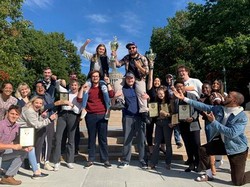Monmouth University’s Institute for Global Understanding (IGU) co-hosted an online forum in collaboration with Peace Boat and the International Campaign to Abolish Nuclear Weapons (ICAN) on Tuesday, April 5. The forum highlighted the moving testimonies of atomic bomb survivors from Hiroshima, Japan.
Peace Boat is a Japan-based international, non-governmental organization (NGO) that works to promote peace, human rights, and sustainability. One of Peace Boat’s flagship testimonial programs, “Every Second Counts for Survivors,” sheds light on Hiroshima and Nagasaki atomic bomb survivors’ experiences.
Randall Abate, J.D., Professor in the Department of Political Science and Sociology and Director of the Institute for Global Understanding kicked off the presentations with some opening remarks. He then introduced Claire Crimando, a final year MSW Global Community Practice student in Monmouth’s School of Social Work. Crimando was partly responsible for organizing the content of the event as she is also a Peace Boat US Nuclear Disarmament & Sustainable Development Goals Intern.
“I am excited to bring social work into the sphere of nuclear disarmament,” Crimando started. “I feel so honored to be near this work, and, as social workers, we want to bring peace to the world while improving everyone’s quality of life.” Crimando noted how inundated many may feel when witnessing violence unfold across the world, the most recent of events being the war in Ukraine. “It is hard sometimes to not normalize [violence], but in order for us to work towards peace for the future, we need to be shocked and surprised so that we do not grow to accept our circumstances,” she continued.
Crimando’s presentation largely consisted of educating the audience on Peace Boat’s mission. “In a cruise ship-like style, Peace Boat goes on global voyages with students, educators, and guest speakers in an effort to educate and inform indigenous communities about why we need nuclear disarmament,” said Crimando. While there are arguments for maintaining nuclear arms, Crimando identified reasons Peace Boat, among other organizations, argue against such weaponry. “When we hear that nuclear is a good option or military defense, we have to remember that it is a horrendous, heinous, insidious alternative.”
Following Crimando’s presentation was the pinnacle of the night’s event— the storytelling of the “Hibakusha,” translated for “atomic bomb survivors.” This portion consisted of a testimonial video from the survivor herself, as well as a follow-up opportunity for audience members to ask questions.
Though the testimony was not in English, the message was able to cross international boundaries, bursting through the language barrier. The movements and mannerisms of the speaker and her ventriloquist doll, as well as subtitles, her account resonated with most of the audience members. Many attendees utilized the forum’s chat feature to thank the survivor for sharing her story. The survivor concluded by emphasizing the need to create collective change rather than blame one country over another.
Reflecting upon the night’s event, Abate said, “I think the survivor’s story offered a compelling and moving example of how the greatest tragedies of human history risk repeating themselves if we don’t learn from the mistakes of the past…The students learned a valuable connection in how the war in Ukraine can become the next Hiroshima and Nagasaki if we don’t educate ourselves on the tragedy of those fateful nuclear attacks in 1945.” Crimando summarized her points to The Outlook, saying, “The bottom-line: there is never a violent solution. Nuclear weapons are not a form of defense, and none of us are truly safe until the usage is completely outlawed and nuclear weaponry eradicated.”



